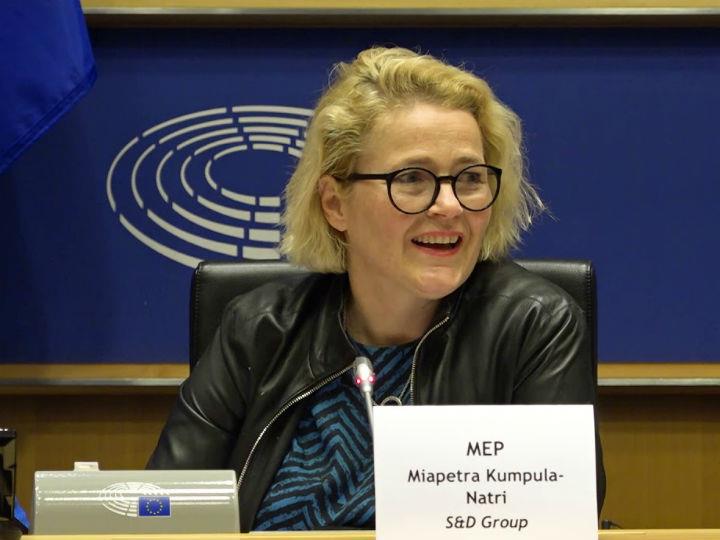by Samuel Stolton
In order for the goals in the EU’s data strategy to be realised, connectivity is a necessary prerequisite, but the bloc should also be wary of implementing policies that move towards a culture of data localisation, says Finnish MEP Miapetra Kumpula-Natri.
We’ve seen unprecedented challenges to our everyday way of life as part of the coronavirus crisis. In what way has connectivity helped in this challenge and has the pandemic also exposed Europe’s ‘connectivity divide’ across certain areas of the continent? What lessons can we learn from this?
The pandemic has shown the importance of connectivity. How capable have you or your organisation been when adapting to remote working? The European Parliament has provided a good example, I think. Who thought in February 2020, that by Autumn everything, including voting, speeches, meetings, could be conducted remotely?
However, the situation has also shown that if you are not able to adapt to the changing situation, because of a lack of skills, equipment, or connections, you will fall behind. I think this is the lesson we have to take seriously when moving towards an era of 5G, data, and artificial intelligence. We do not want the EU to fall behind.
How concerned are you that Europe’s 5G targets have fallen by the wayside? Delays to spectrum auctions have taken place as a result not only of the coronavirus but also because of ongoing geopolitical concerns over the security of next-generation telecommunications networks. Should the EU rush to rapidly deploy 5G technologies in order to meet previous targets, or adopt a more cautious approach?
Concerned is perhaps not the word I would use, but I’m a bit frustrated. We had a clear agreement that the 5G spectrum auctions should be done by 2021, yet where are we now? Only some 26% of the auctions have been done in the EU. Therefore I do appreciate that the Commission has taken some action, with the 5G security toolbox to address the security concerns that in my opinion have to be taken seriously, as well as with the new 5G “roll-out” toolbox.
Very-high capacity networks should not be forgotten. For me the motivation is simple: how can we create the innovations of tomorrow such as the Internet of Things and be the leader in the usage of industrial data, if connectivity is not there? The equation is impossible.
A word on security: It is, of course, a complex question, and not only about technical aspects but it has a huge geopolitical aspect as well. What makes it even more complex for the EU is that member states are having quite a variation on the implementation of the 5G security toolbox, so finding the “coherent” line is not always easy. Therefore, I am looking forward to seeing the Commission report on the issue, which was supposed to come out in October, to see if further harmonisation is needed.
How instrumental will the budget allocation be in the forthcoming multi-annual financial framework and the recovery and resilience fund in order to address some of the challenges to Europe’s connectivity?
It has been outlined clearly, 20% of the recovery fund is aimed for digitalisation. This makes roughly 150 billion euros, just with the next generation of EU funds. In my opinion, this injection should be done in a way that allows the EU to come back stronger.
Although I am happy that the Parliament managed to negotiate more resources in the recent negotiations, of course, the expectations of Parliament and the Commission was much higher, for example for the Digital Europe and Horizon Europe funding programs, than what the final package will be in multi-annual financial framework.
The aim must be, where do we want to be in 2030? So connectivity, yes, but also other crucial elements, such as data economy, supercomputing & artificial intelligence.
You are the rapporteur for the Parliament’s industry committee report on the European strategy for data. How vital is connectivity in ensuring that the bloc is able to make the most out of the non-personal data that it produces?
It is vital. I have outlined three main pillars for digitalisation: One – the flow of data, including the importance of interoperability, two – skills and understanding what data an entity possesses and how it can be used, and three – infrastructure, connectivity, high-performance computing and systemic capacity including new tech. And also of course – let’s not forget the cloud!
I recognise the digital gap and actions are needed. But market-based competition is still the best tool in the long run. When the amount of data is doubling every year and a half or so, connectivity is the tool that creates and transfers data. If Europe’s industry does not adapt to next-generation connectivity, and if they are not willing to understand the data as a reusable resource, we will not able to harvest the benefits of a well-functioning data economy.
What do you envisage the toughest challenges to be in the EU’s future data goals? How can these be mitigated?
I would like to raise up two key terms here: interoperability & real-time data use. As always when we talk about the EU, we have challenges with fragmentation. The 27 EU countries have really different backgrounds and different setups of systems even on a technical level, so it will be a vital exercise to find the “lingua franca” of data sharing.
The aim should be real-time services for citizens and companies; which means more efficient policy-making, less bureaucratic burdens, saving time and money.
After talking with experts, and now I am diving into more “tech-nerd” stuff, we should be emphasising the importance of well-formed APIs, Application programming interfaces. Via well-formed APIs, we are able to jump 20 years ahead in the progress, and aim towards the automated, real-time flow of data and creating synergies between digital services.
What’s your response to some of the criticisms of the EU’s Data Governance Act, to be presented by the Commission next week, that it presents a ‘protectionist’ approach to data use?
I will first wait for the final proposal from the commission, one needs to be careful when addressing unfinished work. I agree with the Commission that when sensitive data, for example, the secondary use of health data, or intellectual property-related data, is processed and used, we need to ensure a high level of security in every step. This must be guaranteed regardless of where data is processed. If there is a risk for different foreign jurisdictions to set requirements that put sensitive data at risk, that threat needs to be addressed.
Moreover, every company operating with the data of European citizens must respect our rules, no matter where the companies come from! Also, if European citizens’ data is dealt with outside of Europe, it is important to ensure the application has a high level of legal protection as in the EU.
I will eagerly look at different aspects for securing data in governance, because trust may not be built on false promises. Also, the international framework for these questions is still weak. For me, data localisation is not the first answer to these challenges and should be used only in very critical circumstances.
Data localisation requirements may backfire against well-functioning systems or European companies, as they also operate in the global economy. I am leaning towards principles of ensuring users’ sovereignty over their data and guaranteeing transparency, including allowing users to obtain information on where their data is located. Let’s see the final proposal!
The term ‘data sovereignty’ has been bandied about by many in Europe without much substance. What does the phrase mean to you and is genuine European data sovereignty achievable?
As long as data sovereignty does not mean some sort of an EU ‘isolation’, it sounds like we are really pushing ahead. However, perhaps instead of data sovereignty, I would use the phrase “European data ecosystems” that are based on a fair market, which does not result in a concentration of data and upholds European values.
We do not live in isolation and the digital economy is a part of the global market. This creates opportunities for European players. Now we need to make sure that we create opportunities for exciting and upcoming European players to develop and grow, while at the same time guaranteeing that European rules are respected. At the same time, we need to build ‘The Brussels Effect’ also with technology, on the verge as we are, of a next-generation industrial revolution.
*first published in: www.euractiv.com




 By: N. Peter Kramer
By: N. Peter Kramer
